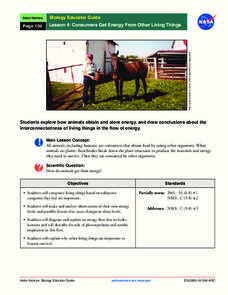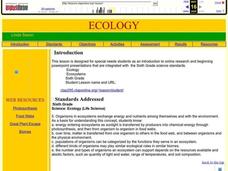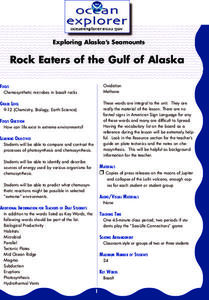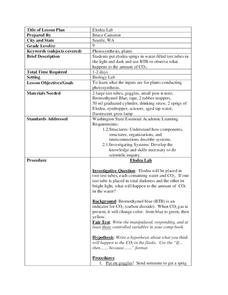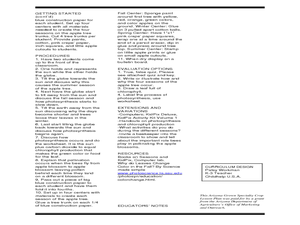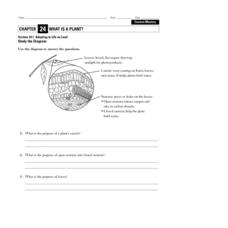NASA
Consumers Get Energy From Other Living Things
How do plants and animals get their food? Learn about where energy comes from, how animals store energy, and aerobic respiration, in a instructional activity that allows scholars to diagram energy flows.
Curated OER
Benefits of Indoor Plants
Learners diagram a plant. In this Science lesson, students explore the concept of photosynthesis focusing on the oxygen production. Learners calculate the amount of plants needed to filter the air in their classroom.
Curated OER
Ecology
Sixth graders are introduced to online research and beginning PowerPoint presentations that are integrated. They pass a plant and photosynthesis. Students locate information on a self selected animal online. They give a PowerPoint...
Curated OER
Rock Eaters of the Gulf of Alaska
High schoolers compare and contrast the processes of photosynthesis and chemosynthesis. They identify and describe sources of energy used by various organisms for chemosynthesis.
Curated OER
Elodea Lab
Young scholars observe the changes between elodea leaves placed in darkness and light. In this life science instructional activity, students experiment to find evidence of photosynthesis in elodea leaves. Young scholars use...
Curated OER
Creatures That Glow In The Night
Students investigate the different bioluminescent organisms. They use microscopes in order to make observations and draw what is seen. Students demonstrate they have studies the differences between the process of photosynthesis and...
Curated OER
Biomass As a Fuel
Students investigate the use of biomass as a fuel. They discuss energy and its uses in their homes. They explore the two types of energy, potential and kinetic and examples of both types. They study the process of photosynthesis and...
Curated OER
Apple: Bare to Pick
Students investigate the seasons of the apple tree. In tree seasons lesson, students use a sun model and a globe to study the tilt of the Earth to create the seasons. Students discuss the tilt and the seasons. Students discuss...
Curated OER
Let it Grow!
Students explain the relationship of plants and animals in the environment. They name the basic requirements for plant growth and define the terms photosynthesis, stomata, chlorophyll and xylem.
Curated OER
Energy Extravaganza
Tenth graders study how cells and organisms acquire and release energy through photosynthesis and cellular respiration. They explain that living organisms use matter and energy to synthesize a variety of organic molecules and they will...
Curated OER
Energy in a Cell
In this energy worksheet, students describe how plants store energy and how animals use the energy stored in plants by answering 5 short answer questions.
Curated OER
Adapting to Life on Land
In this plant structure worksheet, 5th graders will use a diagram of a leaf to complete 3 short answer questions on the purpose of a plant's cuticle, open and closed stomata, and leaves.
Curated OER
Cells - Building Blocks of Life
In this cells worksheet, students review cell organelles and their functions plus the different processes that take place within cells. This worksheet has 9 matching and 5 true or false questions.
Curated OER
Plant Actions
Young scholars explore plant life. For this biology lesson plan, students take part in 2 activities that require them to study photosynthesis and water transport in plants.
Curated OER
What Role Do Forest Play in Continuing or Renewing Our Planet's Resources?
Students explore the interaction between the forest and wildlife. In this forestry lesson, students collect data about forest ecosystems, species of trees, photosynthesis, and interaction of organisms. They prepare a lab activity to...
Curated OER
Respiration
Students explore Adenosine Triphosphate and how energy is released. They examine the basic process of cellular respiration and draw its chemical formula. After describing cellular respiration and photosynthesis, students compare and...
Curated OER
Carbon Creating Activity
In this carbon worksheet, students follow directions and use marshmallows and toothpicks to made carbon dioxide and glucose molecules. Students do this to see how carbon changes as a result of photosynthesis.
Curated OER
BIoluminescence
Students investigate the concept of bioluminescence. They use dinoflagellates in a lab situation to study photosynthesis. They conduct research into the concept using a variety of resources. Also the class is taken on a field trip to...
Curated OER
This Life Stinks
Students study how organisms that live in cold seep communities get energy from methane. In this organism instructional activity students write a brief report and identify oxidation reduction reactions and explain if these are...
Curated OER
A Pre-Treatment Model for Ethanol Production Using a Colorimetric Analysis of Starch Solutions
Students recognize the benefits of ethanol and study photosynthesis. In this ethanol lesson plan students complete an experiment that shows the procedure that starch can be hydrolyzed by salivary amylase.
Curated OER
Microscope Investigation
Young scholars explore physical science by participating in a science examination. In this microscope tutorial lesson, students read the book The Naked Eye and discuss the purpose for using a microscope in the field of science. Young...
Curated OER
Chalkboard Challenge
In this PowerPoint, students compete in a quiz show game similar to Jeopardy in which they generate questions to match science facts in a number of categories. Science concepts covered include plants, animals, and matter. Due to the vast...
Curated OER
Starch is Everywhere
In this science worksheet, students add a few drops of iodine solution to each of 10 substances to determine if they contain starch. The iodine will turn blue if the item contains starch.
Curated OER
Let's Create an Ecosystem
Seventh graders discover how an ecosystem works by creating one in class. In this Earth science lesson, 7th graders study vocabulary terms associated with ecosystem and read environment handouts. Students create an...


